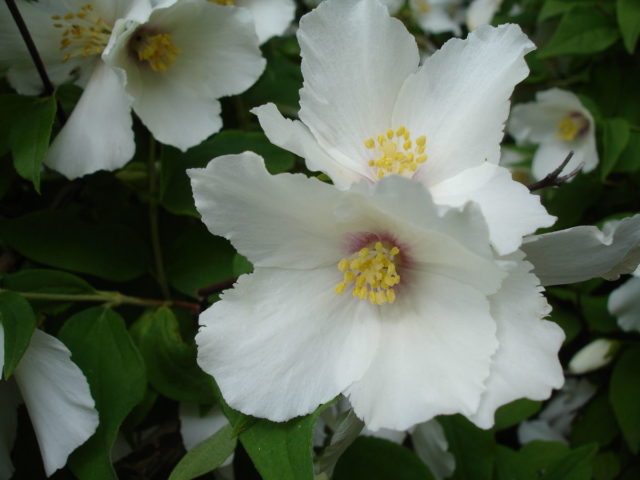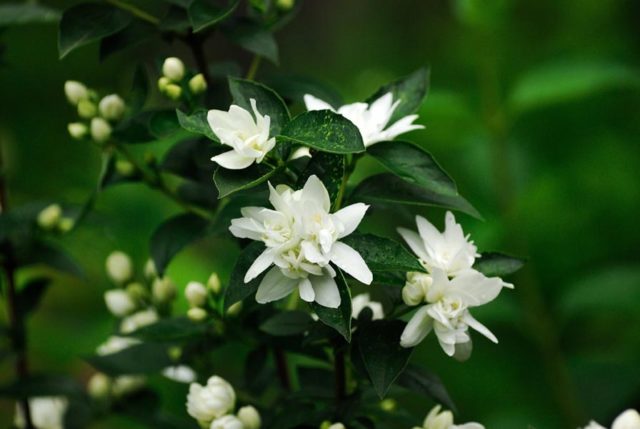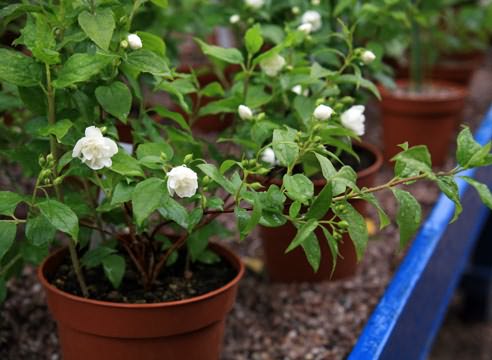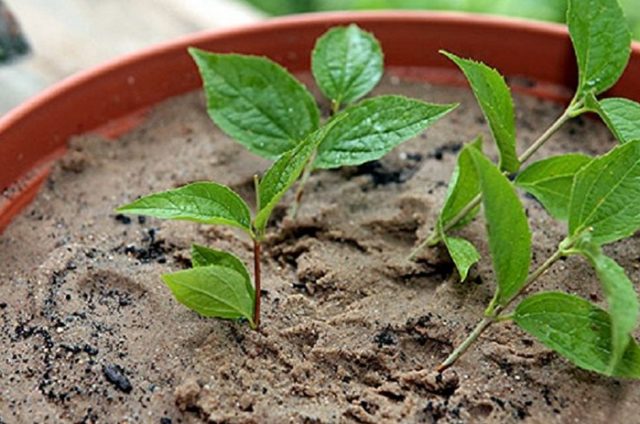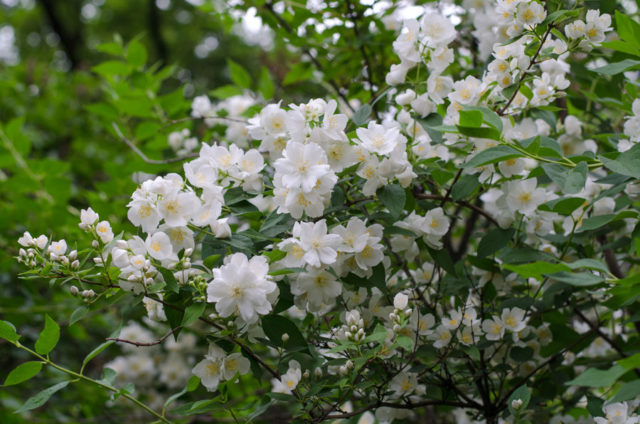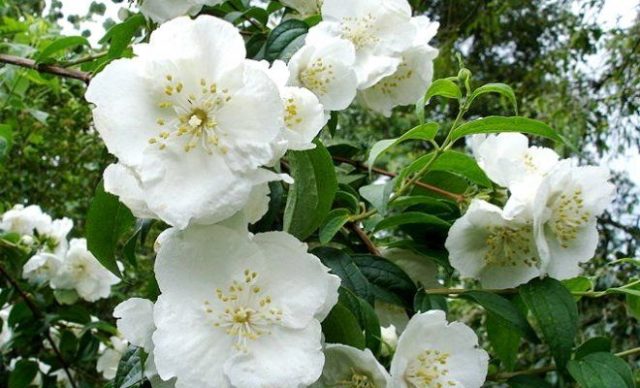Content
- 1 How can garden jasmine be propagated?
- 2 How to cut a chubushnik
- 3 Recommended timing
- 4 Collection and preparation of cuttings
- 5 Choosing a grafting method and preparing the soil
- 6 Features of the reproduction of a mock-orange by cuttings in spring, summer and autumn
- 7 Features of the reproduction of a mock-orange by seeds
- 8 How garden jasmine reproduces by layering
- 9 Reproduction of garden jasmine by dividing the bush
- 10 Seedling care
- 11 Transplant rules
- 12 Conclusion
You can propagate a mock orange or garden jasmine in various ways. Depending on what result they want to get, they choose cuttings, layering or growing seedlings from seeds. It may take more than one year, but self-grown seedlings will turn into strong and beautiful plants.
How can garden jasmine be propagated?
Chubushnik or garden jasmine is a wonderful plant with white flowers. It is called garden jasmine because of its strong, pleasant aroma. The shrub is unpretentious, does not require special care and grows quickly. If you carry out regular pruning of the chubushnik, it will have a compact, beautiful shape, and will decorate the site. The choice of breeding method depends on the type of shrub.
There are different varieties of garden jasmine. They differ in the shape and size of flowers, shades of color and aroma: some smell of strawberries, others - exquisite perfume.
Shrubs bloom in late spring, early summer. Depending on the variety, the flowering time may be shifted to a later date.
Varietal varieties are propagated vegetatively - by layering or cuttings.
Seed propagation of a shrub called chubushnik is applied to natural species. They do not have such large flowers, but the flowering is abundant and beautiful, a pleasant and rich aroma.
How to cut a chubushnik
Chubushnik or garden jasmine is easy to propagate by cuttings. There are several ways of grafting, depending on the season. In the spring, green branches are harvested for rooting, breaking them off together with the "heel". They do the same in the summer, immediately after flowering, breaking off strong shoots that begin to lignify.
In autumn, cuttings can be prepared using a sharp pruner, leaving at least two internodes on each shoot.
Recommended timing
For reproduction of the mock-orange by cuttings in the spring, the shoots are cut when the flower buds swell. Summer semi-lignified shoots are broken off for rooting during flowering or immediately after it - in June. In the fall, they begin harvesting cuttings when the leaves fall off, so that pruning does not cause intensive growth of new shoots.
Collection and preparation of cuttings
Cuttings are collected and prepared according to the scheme:
- The green twig is broken off with a "heel".
- The lower leaves are removed, the upper ones are shortened by half, leaving two nodes and one internode.
- Lignified cuttings are cut with pruning shears. You can use the branches left after the formation of the crown.
- On lignified shoots, an oblique cut is made at the bottom, and a straight cut at the top, so as not to confuse in the spring with which end to plant in the ground.
Choosing a grafting method and preparing the soil
The soil for planting is bought in the store. You can prepare a soil mixture yourself by mixing in equal parts vermicompost or fertile loam and peat with neutral acidity.
For disinfection, the soil is calcined in the oven and watered with "Fitosporin".
For planting, take a clean plastic pot with holes in the bottom to drain the water. Prepared green shoots are planted in a pot of soil, and covered with a cut plastic bottle or transparent bag.
Planted cuttings of garden jasmine are placed under a tree, where there is no direct sunlight. The roots will appear in about a month. All this time, the seedlings are being watched. If condensation has accumulated on the walls of the bottle or bag, the soil is not watered. In cool weather, cuttings are brought into the house or placed in a greenhouse. The optimum temperature for rooting is not lower than + 20 ... + 22 ° C.
How to root a shank in water
After cutting the mock-orange in the spring, the twigs take root in the water with difficulty. Sometimes they rot due to gardener's mistakes - using dirty containers or cutting with a blunt tool.
There is a unique method of propagation by cuttings in water, which gives excellent results. Chopped sprigs of garden jasmine are placed in a solution containing a natural root stimulant.
Such a solution is obtained independently by draining water from a vessel with a handle that has already taken root. When a plant begins to take root, it produces special substances that pass into the water. It is good to water recently transplanted crops with such water or to root capricious cuttings of a chubushnik. They quickly form kalyus - white tubercles, which are the primordial roots. It is not necessary to wait until the real roots begin to grow, you can plant jasmine in the soil.
How to propagate chubushnik cuttings in the ground
In summer, a place for breeding chubushnik cuttings is chosen in a shaded area of the garden with fertile and loose soil, without weeds. Holes are made in the ground and cuttings are planted at a short distance from each other.
Sprinkle with water and cover with cut plastic bottles. If there are a lot of shoots, they build a greenhouse by pulling a film over the arcs. Cuttings root at an air temperature of + 22 ... + 25 ° C. Every day, garden jasmine is aired, opening the greenhouse for 10-15 minutes, moisturizing as needed.
Reproduction of a mock-mushroom by cuttings with a "heel"
"Heel" or bark scuffs on the basis of the shoot, broken off from the mother bush, promotes better root formation - this is what experienced gardeners believe. Reproduction of chubushnik in spring with green cuttings:
- Shoots are broken off with a "heel" before flowering.
- Tear off the lower leaves.
- They are planted in a light soil consisting of high-moor peat and sand, mixed in a 1: 1 ratio.
- Roots appear in 2-4 weeks.
Rooted shoots of garden jasmine can be immediately planted in open ground for growing, and the next year, in the spring, transplanted to a permanent place.
Features of the reproduction of a mock-orange by cuttings in spring, summer and autumn
Garden jasmine is propagated in two ways: lignified and green shoots. Reproduction of a mock-orange by cuttings in the fall is an interesting way to get new plants. Lignified cuttings are cut in the fall. In winter, the prepared mock-orange is stored in wet sand in the cellar, just like grape cuttings are kept. In early spring, as soon as the ground warms up, they prepare the chubushnik for planting.
Description of planting lignified shoots:
- An oblique cut is made at the bottom of each cutting. The upper cut is made straight.
- Each stalk is planted in the soil at an angle of 45 °, completely covered with earth, leaving only a bud on the surface.
- Over the summer, the plant will take root, if you do not forget about watering it.
In the fall, spruce branches or fallen leaves are placed on top to protect against frost. And next year, in the spring, they are transplanted to a permanent place.
Rooting of summer and spring cuttings is faster and more efficient. Description of how to propagate garden jasmine by cuttings in summer:
- Immediately after flowering, young shoots are broken off.
- Prepare them for rooting. A slant cut is made at the bottom, a straight cut at the top, the leaves are shortened by half.
- Cuttings are planted in a greenhouse, under metal arcs with oilcloth.
- Every day, the plants in the greenhouse are sprayed so that the leaf plate does not dry out.
Young seedlings will grow from summer shoots of garden jasmine by autumn. For rooting, the ground in a greenhouse with seedlings must be constantly moist.
Features of the reproduction of a mock-orange by seeds
Seeds for reproduction of the crown mock-orange can be bought at the store. In species shrubs of garden jasmine, seed material is harvested independently, at the end of summer. Germination is maintained throughout the year, so it is better to use fresh seeds.
A soil mixture is prepared for sowing seeds. You can buy soil from a seedling store or use an economical option by mixing purchased and garden soil in equal parts. After filling the cells with soil, spread the seeds in them, and sprinkle them with a small layer of sand. Then sprayed from a spray bottle.
Further, stratification is required, the process of seed treatment with prolonged cold. Seeds in a cold state, at temperatures from 0 to + 4 ° C, should spend 2-3 months. At the same time, the soil in which they are located is kept slightly moist. For stratification, the seed cassette is placed in the basement or in the refrigerator at the beginning of January, previously wrapped in film.
They take garden jasmine seeds from the refrigerator in March and put them on the windowsill. Seedlings will appear in 1-2 weeks at temperatures above + 22 ° C, regular moderate watering and good lighting. You can sow chubushnik seeds directly into open ground on frozen ground in the fall, shoots will appear in the spring. Growing from seeds is an easy and affordable way to get a lot of planting material at once.
How garden jasmine reproduces by layering
A simple option for propagating garden jasmine is with the help of layering. Process description:
- In early spring, as soon as the snow melts, they make a small trench next to the chubushnik bush.
- The lower branch is lowered into the prepared groove and fixed with a metal pin.
- From above, the shoot is covered with earth.
- The top of the dug-in branch is raised and tied to a support so that it occupies a vertical position.
- When roots appear on a branch underground, it will begin to actively grow.
A branch of garden jasmine is dripped in to obtain a cut in the spring. The next year, in the spring, with the help of a shovel, part of the shoot that is in the ground is cut off, and a young sapling of the mock-orange is obtained.
Reproduction of garden jasmine by dividing the bush
Reproduction of a chubushnik or garden jasmine by dividing a bush is carried out after autumn leaf fall in October or before the beginning of spring sap flow in April. Timing may vary depending on the climate zone.
The dug out bush is shaken off the ground and divided into several parts with pruning shears. Immediately plant each division in a new place in the prepared hole, water it, and cut off excess branches.
Seedling care
A young chubushnik needs special care. It needs to be watered regularly, the plant does not like drying out of the soil. Complex fertilizers contribute to the growth of shoots. Garden jasmine blooms early, therefore, in the spring, not only nitrogen, but also phosphorus and potassium are introduced under the bushes. It is convenient to buy a ready-made complex fertilizer containing all the necessary elements.
For the correct formation of the crown, the bush is pruned in the summer, immediately after flowering, at the same time the cuttings of the chubushnik are carried out. If the seeds are not needed, the wilted inflorescences are cut off so that the plant does not waste energy on their ripening. After watering, the soil is loosened and weeds are removed. Cover the tree trunk with mulch, which will retain moisture longer and inhibit weed growth.
A young chubushnik is insulated for the winter with spruce branches or an air-dry shelter is built. Adult bushes tolerate frost well, do not need shelter.In early spring, they carry out the prevention of the spread of fungal diseases and pests by treating garden jasmine with insecticides and fungicides, along with other bushes and trees in the garden.
Transplant rules
It is better to transplant the bush to a new place at a young age, up to five years. An old chubushnik can be propagated by cuttings in the spring to plant a young plant in a new place.
Garden jasmine is transplanted in the fall, at the end of September, or in the spring, before the buds open. A pit is prepared in a new place two weeks before the transplant. The bush is watered, and half of the old shoots are removed at the root. The next day, they dig it out together with a lump of earth, and move it to a new hole. Watering and mulching the trunk circle. In the first two weeks, shade from direct sunlight.
Conclusion
It is not at all difficult to propagate a mock on your own. There are several ways in which you can get many free, strong seedlings of a beautiful plant. Which breeding option to choose, each gardener decides independently. Fulfilling the agrotechnical requirements for caring for seedlings, it is easy to grow a young mock orange or garden jasmine from cuttings, seeds or cuttings on your own.
